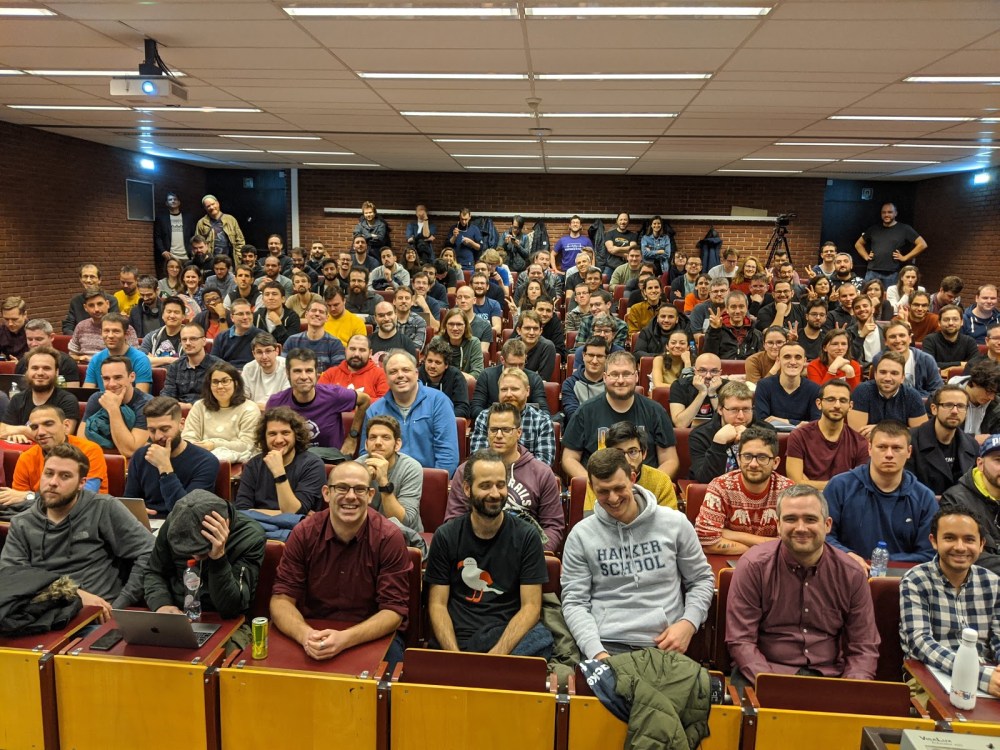Organizing a web performance conference

There are numerous industry conferences dedicated to web performance. We have attended and spoken at several of them, and noticed important topics remain underrepresented. While the logistics of organizing a conference is too daunting for our small team, FOSDEM presents an appealing compromise.
The Wikimedia Performance Team organized the inaugural Web Performance devroom at FOSDEM 2020.
FOSDEM is the biggest Free and Open Source software conference in the world. It takes place in Brussels every year, is free to attend, and attracts over 8000 attendees. FOSDEM is known for its many self-organized conference tracks, known as “devrooms”. The logistics are taken care of by FOSDEM, while we focus on programming the content. We ran our own CfP, curate and invite speakers, and emcee the event.
📖 Read all about it on our blog: Organizing a developer room at FOSDEM
🎥 Watch sessions: Web Performance @ FOSDEM 2020
📙 See also: History of Wikimedia attending FOSDEM
Multi-DC progress
This year saw the completion of two milestones on the MediaWiki Multi-DC roadmap. Multi-DC is a cross-team initiative driven by the Performance Team, to evolve MediaWiki for operation from multiple datacenters. This is motivated by higher resilience, and eliminating steps from switchover procedures. This eases or enables routine maintenance by allowing clusters to be turned off — without a major switchover event.
The Multi-DC initiative has brought about performance and resiliency improvements across the MediaWiki codebases, and at every level of our infrastructure. These gains are effective even in today’s single-DC operation. We resolved long-standing tech debt and improved extension interfaces, which increased developer productivity. We also reduced dependencies, coupling, restructured business logic, and implemented async eventual-consistency solutions.
This year we applied the Multi-DC strategy to MediaWiki’s ChronologyProtector (T254634), and started work on the MainStash DB (T212129).
Read more at Performance/Multi-DC MediaWiki.
Setting up a mobile device lab
Today we collect real-user data from pageviews, which alerts when a regression happens, but doesn’t help investigate and fix why. Synthetic testing complements this for desktop browsers, but we have no equivalent for mobile devices. Desktop browsers have an “emulate mobile” option, but DevTools emulation is nothing like real mobile devices.
The goal of the mobile device lab is to find performance regressions on Wikipedia, that are relevant to the experience of our mobile users. Alerts include detailed profiles for investigation, like we do for desktop browsers today.
📖 Read more at Learnings from setting up a performance device lab
Introducing: Web Perf Hero award
Starting in 2020, we give out a Web Perf Hero award to individuals who have gone above and beyond to improve site performance. It’s awarded (up to) once a quarter to individuals who demonstrate repeated care and discipline around performance.
Browse posts tagged Web Perf Hero award or find an overview of Web Perf Hero award on Wikitech.

Performance perception survey
Since 2018, we have an on-going survey measuring performance perception on several Wikipedias. You can find the main findings in last year’s blog post. An important take-away was that none of the standard and new metrics we tried, correlate well to real user experience. The “best” metric (page load time) scored a mere 0.14 on the Pearson coefficient scale (from 0 to 1). As such, it remains valuable to survey the real perceived performance, as empirical barometer to validate other performance monitoring.
Data from three cohorts, seen in Grafana. You can see that there’s loose correlation with page load time (“loadEventEnd”). When site performance degrades (time goes up), satisfaction gets worse too (positive percentage goes down). Likewise, when load time improves (yellow goes down), satisfaction improves (green goes up).
Refer to Research:Study of performance perception for the full dataset used in the 2019 paper.




Miscellaneous
- The team was published four times in the Web Performance Calendar:
- Web performance case study: Wikipedia page previews.
- Measuring the performance of Wikipedia visitors’ devices.
- “How to Logstash at Wikimedia” (🎥 watch, 📙 slides), explains how we monitor production errors with Logstash dashboards, and demonstrates setting up a triage workflow.
- Wikimedia Performance – Roadmap for 2020
Further reading
- Perf Matters at Wikipedia in 2019
- Perf Matters at Wikipedia in 2018
- Perf Matters at Wikipedia in 2017
- Perf Matters at Wikipedia in 2016
- Perf Matters at Wikipedia in 2015
- Wikimedia booth at FOSDEM 2015
About this post
Featured image by Kuhnmi, CC BY-SA 4.0, via Wikimedia Commons.